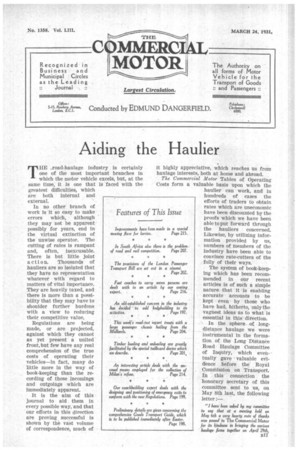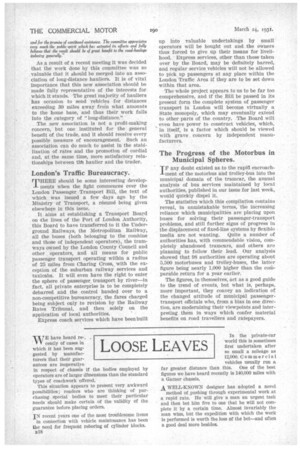Aiding the Haulier
Page 35

Page 36

If you've noticed an error in this article please click here to report it so we can fix it.
THE road-haulage industry is certainly one of the most important branches in which the motor vehicle excels, but, at the same time; it is one that is "faced with the greatest difficulties, which are both internal and external.
In no other branch of work is it so easy to make errors which, although they may not be apparent possibly for years, end in the virtual extinction of the unwise operator. The cutting of rates is rampant and, often, inexcusable. There is but little joint action. Thousands of hauliers are so isolated that they have no representation whatever with regard to matters of vital importance. They are heavily taxed, and there is more than a possibility that they may have to shoulder further burdens with a view to reducing their competitive value.
Regulations are being made, or are projected, against which they cannot as yet present a united front, but few have any real comprehension of the true costs of operating their vehicles—in fact, many do little more in the way of book-keeping than the recording of those incomings and outgoings which are immediately apparent.
It is the aim of this journal to aid them in every possible way, and that our efforts in this direction are proving successful is shown by the vast volume of correspondence, much of it highly appreciative, which reaches us from haulage interests, both at home and abroad. The Commercial Motor Tables of Operating Costs form a valuable basis upon which the haulier can work, and in hundreds of eases the efforts of traders to obtain rates which are uneconomic have been discounted by the proofs which we have been able to put forward through the hauliers concerned. Likewise, by utilizing information provided by us, numbers of members of the industry have been able to convince rate-cutters of the folly of their ways.
The system of book-keeping which has been recommended in our recent articles is of such a simple nature that it is enabling accurate accounts to be kept even by those who have had, hitherto, only the vaguest ideas as to what is essential in this direction: In the.. sphere. of longdistance haulage we were instrumental in the formation of the Long Distance Road Haulage Committee of Inquiry, which even-' tually gave valuable evidence before the Royal Commission on Transport. In this connection the honorary secretary of this committee sent to us, on May 8th last, the following letter :— and for the promise of contihued assistance. The committee appreciates very much the public spirit which ha; actuated its efforts and fully believes that the result should be of great benefit to the road-haulage industry generally."
As a result of a recent meeting it was decided that the work done by this committee was so valuable that it should be merged into an a.ssoelation a long-distance hauliers. It is of vital importance that this new association should be made fully representative of the interests for which it stands. The great majority of hauliers has occasion to send vehicles for distances exceeding 30 miles away from what amounts to the home base, and thus their work falls into the category of "long-distance."
The new association is not a profit-making concern, but one instituted for the general benefit of the trade, and it should receive every possible measure of encouragement. Such an association can do much to assist in the stabilization of rates and the promotion of cordial and, at the same time, more satisfactory relationships between tife haulier and the trader.
London's Traffic Bureaucracy. s Tr HERE should be some interesting develop-1ments when the fight commences over the London Passenger Transport Bill, the text of which was issued a few days ago by the Ministry of Transport, a résumé being given elsewhere in this issue.
It aims at establishing a Transport Board on the lines of the Port of London Authority, this Board to have transferred to it the Underground Railways, the Metropolitan Railivay, all the buses (both belonging to the combine and those of independent operators), the tramways owned by the London County Council and other operators, and all means for public passenger transport operating within a radius of 25 miles from Charing Cross, with the exception of the suburban railway services and taxicabs. It will even have the right to enter the sphere of passenger transport by river—in fact, all private enterprise is to be completely debarred and the control handed over to a non-competitive bureaucracy, the fares charged being subject only to revision by the Railway Rates Tribunal, and then solely on the application of local authorities.
Express coach services which have been built up into valuable undertakings by small operators will be bought out and the owners thus forced to give up their means for livelihood. Express services, other than those taken over by the Board, may be definitely barred, and regular service vehicles will not be allowed to pick up passengers at any place within the London Traffic Area if they are to be set down within that area.
The whole project appears to us to be far too comprehensive, and if the Bill be passed in its present form the complete system of passenger transport in London will become virtually a State monopoly, which may eventually extend to other parts of the country. The Board will even have power to construct vehicles, which, In itself, is a factor which should be viewed with grave concern by independent nianu.facturers.
The Progress of the Motorbus in Municipal Spheres.
IF any doubt existed as to the rapiri encroachment of the motorbus and trolley-bus into the municipal domain of the tramcar, the annual analysis of bus services maintained by -local authorities, published in our issue for last week, would quickly dispel it.
The statistics which this compilation contains reveal, in unmistakable terms, the increasing reliance which municipalities are placing upon buses for solving their passenger-transport problems, and still further signs of progress in the displacement of fixed-line systems by flexible media are not wanting. Quite a number of authorities has, with commendable vision, completely abandoned tramcars, and others are planning to follow their lead. Our analysis showed that 98 authorities are operating about 5,500 motorbuses and trolley-buses, the latter figure being nearly 1,000 higher than the coni-tparable return for a year earlier.
The figures, in themselves, act as a good guide to the trend of events, but what is, perhaps, more important, they convey an indication of the changed attitude of municipal passengertransport officials who, from a bias in one direction, are modernizing their viewpoints and interpreting them in ways which confer material benefits on road travellers and ratepayers.




































































































